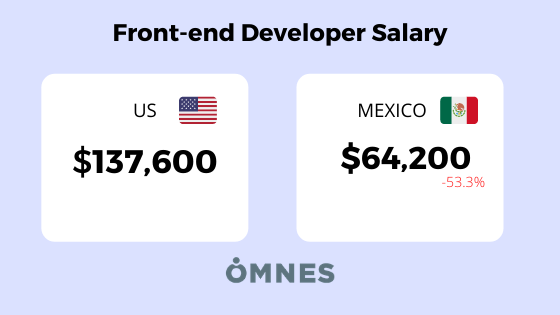IT Recruiting
How to hire a JavaScript developer?

The numbers don’t lie: JavaScript powers 98% of websites and remains the most popular programming language among professional developers for the 11th consecutive year. Yet most startup founders struggle with a fundamental challenge, how do you hire JavaScript developer talent when you don’t have an in-house technical team to guide the process?
With AI reshaping development workflows and remote-first culture changing collaboration dynamics, the skills landscape for JavaScript developers has evolved dramatically. What worked for hiring JS talent two years ago might leave you with candidates who can’t handle your modern tech stack requirements.
This guide cuts through the complexity. We’ll walk you through exactly what technical skills matter in 2025, where to find top-tier JavaScript developers, and how to evaluate candidates without getting lost in technical jargon you don’t understand.
Why Your Startup Can’t Afford to Skip JavaScript Development
Here’s what most founders miss about JavaScript: it’s not just a frontend language anymore. The current market shift toward full-stack JavaScript development means one skilled developer can handle your entire web application architecture.
Frontend Power: Modern JavaScript frameworks like React 18 with server-side rendering capabilities can deliver the interactive user experiences your customers expect. Vue.js and Angular offer similar advantages with different architectural approaches.
Backend Reality: Node.js has matured into a enterprise-grade backend solution. Companies like Netflix, LinkedIn, and PayPal run their core services on Node.js because it enables rapid development cycles—exactly what your MVP needs.
Full-Stack Advantage: A senior JavaScript developer can build your complete web application using a unified technology stack. This reduces complexity, speeds up development, and minimizes the communication overhead between frontend and backend teams.
Given the current shortage of specialized developers across most tech disciplines, JavaScript’s versatility makes it the strategic choice for resource-constrained startups.

How to Hire JavaScript Developer: The Startup Founder’s Technical Guide
The numbers don’t lie: JavaScript powers 98% of websites and remains the most popular programming language among professional developers for the 11th consecutive year. Yet most startup founders struggle with a fundamental challenge—how do you hire JavaScript developer talent when you don’t have an in-house technical team to guide the process?
With AI reshaping development workflows and remote-first culture changing collaboration dynamics, the skills landscape for JavaScript developers has evolved dramatically. What worked for hiring JS talent two years ago might leave you with candidates who can’t handle your modern tech stack requirements.
This guide cuts through the complexity. We’ll walk you through exactly what technical skills matter in 2025, where to find top-tier JavaScript developers, and how to evaluate candidates without getting lost in technical jargon you don’t understand.
Why Your Startup Can’t Afford to Skip JavaScript Development
Here’s what most founders miss about JavaScript: it’s not just a frontend language anymore. The current market shift toward full-stack JavaScript development means one skilled developer can handle your entire web application architecture.
Frontend Power: Modern JavaScript frameworks like React 18 with server-side rendering capabilities can deliver the interactive user experiences your customers expect. Vue.js and Angular offer similar advantages with different architectural approaches.
Backend Reality: Node.js has matured into a enterprise-grade backend solution. Companies like Netflix, LinkedIn, and PayPal run their core services on Node.js because it enables rapid development cycles—exactly what your MVP needs.
Full-Stack Advantage: A senior JavaScript developer can build your complete web application using a unified technology stack. This reduces complexity, speeds up development, and minimizes the communication overhead between frontend and backend teams.
Given the current shortage of specialized developers across most tech disciplines, JavaScript’s versatility makes it the strategic choice for resource-constrained startups.
The Technical Skills That Actually Matter in 2026
While most recruitment focuses on keyword matching, successful JavaScript hiring requires understanding how different skills connect to real project needs.
Core JavaScript Competencies
Modern ES6+ Features: Your developer needs deep understanding of async/await patterns, destructuring, and module systems. These aren’t nice-to-haves—they’re fundamental to maintainable code architecture.
Framework Expertise: Don’t just look for “React experience.” You need someone who understands React hooks, context API, and component lifecycle optimization. For backend roles, Express.js knowledge should include middleware patterns and RESTful API design principles.
Technical Stack Integration
Database Understanding: JavaScript developers should be comfortable with both SQL (PostgreSQL, MySQL) and NoSQL (MongoDB) databases. Modern applications require hybrid approaches.
Cloud-Native Architecture: With infrastructure-as-code becoming standard, look for familiarity with containerization (Docker) and basic CI/CD pipeline concepts.
API Design Philosophy: RESTful services are table stakes, but GraphQL experience indicates a developer who understands data fetching optimization—crucial for performance-sensitive applications.
The Collaboration Factor
Remote work has fundamentally changed how we evaluate JavaScript developers. Technical skills alone won’t guarantee project success. You need someone who can document their code clearly, communicate architectural decisions effectively, and work asynchronously across time zones.
When to choose full-stack developer?
If you want to build an app or website from scratch, then you should consider hiring a full-stack developer. They will take care of both front-end and back-end development and they should have extent knowledge and experience. They are very skillful, but that doesn’t necessarily mean that they are experts in any one part of the stack. Although full-stack developer might know how to finish your project well, it might be too much to handle for just one person.

Where Smart Founders Find JavaScript Developer Talent
The traditional approach of posting on job boards and hoping qualified candidates apply doesn’t work in today’s competitive JavaScript market. Here’s where you’ll actually find available talent:
Developer Communities
GitHub: Look beyond repositories. Check contribution patterns, code quality in pull requests, and involvement in open-source projects relevant to your tech stack.
Stack Overflow: Active contributors often demonstrate problem-solving abilities and communication skills—both critical for startup environments.
Specialized Platforms
Remote-First Job Boards: WeWorkRemotely and RemoteOK attract developers specifically interested in startup opportunities. AngelList remains valuable for equity-motivated candidates.
Freelance Networks: Toptal and Gun.io pre-screen technical competency, though you’ll pay premium rates for this vetting.
The Reality Check
Most qualified JavaScript developers aren’t actively job searching. They’re working on interesting projects and only consider moves for compelling opportunities. This is where targeted recruitment becomes essential.
How to Evaluate JavaScript Developers Without Technical Expertise
Here’s what most companies miss about technical evaluation: you don’t need to understand code syntax to assess candidate quality.
Portfolio Review Strategy
Project Complexity: Look for applications with user authentication, data persistence, and real-time features. These indicate full-stack competency.
Code Organization: Well-structured GitHub repositories with clear README files and organized folder structures suggest attention to maintainable code practices.
Technology Choices: Can the candidate explain why they chose specific frameworks or libraries for different projects? This reveals architectural thinking.
Practical Assessment Approaches
Problem-Solving Scenarios: Present a business challenge and ask how they’d approach the technical solution. Focus on their thought process, not code specifics.
Communication Evaluation: Can they explain technical concepts in business terms? This skill becomes crucial when discussing feature requirements and timeline estimates.
Collaboration Simulation: Involve them in discussions about your product roadmap. Their questions and suggestions reveal how they think about technical implementation within business constraints.
Red Flags to Avoid
Technology Name-Dropping: Candidates who list every JavaScript framework without explaining practical application often lack depth.
Reluctance to Discuss Challenges: Experienced developers should readily share examples of technical problems they’ve solved and lessons learned from project failures.
Critical Mistakes That Derail JavaScript Developer Hiring
Based on our experience with similar roles, these are the hiring pitfalls that consistently trip up startup founders:
The “Everything Developer” Trap
Expecting one JavaScript developer to handle frontend, backend, DevOps, and mobile development typically results in mediocre execution across all areas. Define your immediate technical priorities and hire accordingly.
Underestimating Market Rates
Junior JavaScript developers command $75-90K annually, while senior professionals expect $120-150K+. Offshore alternatives exist, but managing remote development teams requires different skills than most founders possess.
Ignoring Cultural Integration
Technical competency means nothing if the developer can’t adapt to your startup’s fast-paced, ambiguous environment. Assess tolerance for changing requirements and comfort with wearing multiple hats.
Rushing the Technical Vetting Process
The cost of hiring the wrong JavaScript developer extends far beyond salary. Poor architectural decisions made early in development can require months of refactoring later.

The Fast Track: Strategic Partnership Approach
While most recruitment focuses on volume—sending multiple CVs hoping one fits—we’ve built our process around understanding your specific technical architecture needs.
Technical Requirements Analysis: We map your product roadmap to specific JavaScript competencies, ensuring candidates can grow with your platform’s complexity.
Market Intelligence Integration: Our understanding of current JavaScript developer availability and compensation expectations helps you compete effectively for top talent.
Collaborative Evaluation Process: Rather than screening candidates in isolation, we involve you in technical discussions that reveal both competency and cultural fit.
Post-Hire Integration Support: The relationship doesn’t end with successful placement. We provide guidance on onboarding technical talent and establishing productive development workflows.
This approach recognizes a fundamental truth: hiring JavaScript developers requires both technical insight and market intelligence that most startups lack internally.
Your Next Steps: From Technical Confusion to Clear Action
The demand for skilled JavaScript developers will only intensify as more businesses prioritize digital experiences. Companies that establish efficient technical hiring processes now gain competitive advantages in product development speed and quality.
Immediate Actions:
- Define your technical priorities: MVP features vs. scalability requirements
- Establish realistic timeline and budget parameters for JavaScript development
- Create evaluation criteria that balance technical skills with startup adaptability
Strategic Considerations:
- JavaScript ecosystem evolution means skills requirements change rapidly
- Remote collaboration capabilities have become as important as coding competency
- Market competition for top talent requires compelling value propositions beyond salary
Ready to hire a JavaScript developer who can actually deliver your product vision? Let’s discuss how our technical expertise and market intelligence can accelerate your hiring process while ensuring you find candidates who thrive in startup environments.
The complexity of modern JavaScript development doesn’t have to complicate your hiring decisions. With the right technical guidance and candidate evaluation process, you can build the development capabilities your startup needs to scale successfully.
Contact Omnes Group today and discover how specialized technical recruitment can transform your hiring timeline from months of uncertainty to weeks of focused progress.